- Home
- Frank Herbert
The Heaven Makers (v4.0) Page 6
The Heaven Makers (v4.0) Read online
Page 6
She stood at his left just behind the car, a slender woman in a black silk suit that smoothed her full curves. Her red hair, usually worn close around her oval face, was tied in a severe coil at the back of her neck. The hair bound so tightly -- Thurlow tried to put out of his mind all memory of the mother's hair spread on the driveway.
Ruth's green eyes stared at him with a look of hurt expectancy. She had the appearance of a tired elf.
Thurlow opened his door, slipped out to the wet grass beside the road.
"I didn't hear your car," he said.
"I've been staying with Sarah, living with her. I walked up from the house. That's why I'm so late."
He could hear the tears in her voice and wondered at the inanity of their conversation.
"Ruth . . . damn it all! I don't know what to say." Without thinking about it, he crossed to her, took her in his arms. He could feel her muscles resisting him. "I don't know what to say."
She pulled out of his embrace. "Then . . . don't say anything. It's all been said anyway." She looked up at his eyes. "Aren't you still wearing your special glasses?"
"To hell with my glasses. Why wouldn't you speak to me on the phone? Was that Sarah's number they gave me at the hospital?" Her words were coming back to him, ". . . living with her." What did it mean?
"Father said . . ." She bit her lower lip, shook her head. "Andy, oh, Andy, he's insane and they're going to execute him . . ." She looked up at Thurlow, her lashes wet with tears. "Andy, I don't know how to feel about him. I don't know . . ."
Again, he took her in his arms. She came willingly this time. How familiar and right it felt for her to be there. She began to sob gently against his shoulder. Her crying felt like the spent aftermath of sorrow.
"Oh, I wish you could take me away from here," she whispered.
What was she saying? he asked himself. She was no longer Ruth Murphey. She was Mrs. Neville Hudson. He wanted to push her away, start throwing questions at her. But that wouldn't be professional, not the right psychological thing to do. He decided it wasn't what he wanted to do after all. Still, she was another man's wife. Damn! Damn! Damn! What had happened? The fight. He remembered their fight -- the night he'd told her about the fellowship grant. She hadn't wanted him to take it, to be separated for a year. Denver had sounded so far away in her words. "It's only a year." He could hear his own voice saying it. "You think more of your damn career than you do of me!" The temper matched her hair.
He'd left on that sour note. His letters had gone into a void -- unanswered. She'd been "not home" to his telephone calls. And he'd learned he could be angry, too -- and hurt. But what had really happened?
Again, she said: "I don't know how to feel about him."
"What can I do to help?" It was all he could say, but the words felt inadequate.
She pushed away from him. "Anthony Bondelli, the attorney -- we've hired him. He wants to talk to you. I . . . I told him about your report on . . . father -- the time he turned in the false fire alarm." Her face crumpled. "Oh, Andy -- why did you go away? I needed you. We needed you."
"Ruth . . . your father wouldn't take any help from me."
"I know. He hated you . . . because of . . . what you said. But he still needed you."
"Nobody listened to me, Ruth. He was too important a man for . . ."
"Bondelli thinks you can help with the insanity plea. He asked me to see you, to . . ." She shrugged, pulled a handkerchief from her pocket, wiped her cheeks.
So that's it, Thurlow thought. She's making up to me to get my help, buying my help!
He turned away to hide his sudden anger and the pain. For a moment, his eyes didn't focus, then he grew aware (quite slowly, it seemed) of a subtle brownian movement at the edge of the grove. It was like a swarm of gnats, but unlike them too. His glasses. Where were his glasses? In the car! The gnats dissolved away upward. Their retreat coincided with the lifting of an odd pressure from his senses, as though a sound or something like a sound had been wearing on his nerves, but now was gone.
"You will help?" Ruth asked.
Was that the same sort of thing I saw at Murphey's window? Thurlow asked himself. What is it?
Ruth took a step nearer, looked up at his profile. "Bondelli thought -- because of us -- you might . . . hesitate."
The damned pleading in her voice! His mind replayed her question. He said: "Yes, I'll help any way I can."
"That man . . . in the jail is just a shell," she said. Her voice was low, flat, almost without expression. He looked down at her, seeing how her features drew inward as she spoke. "He's not my father. He just looks like my father. My father's dead. He's been dead . . . for a long time. We didn't realize it . . . that's all."
God! How pitiful she looked!
"I'll do everything I can," he said, "but . . ."
"I know there isn't much hope," she said. "I know how they feel -- the people. It was my mother this man killed."
"People sense he's insane," Thurlow said, his voice unconsciously taking a pedantic tone. "They know it from the way he talks -- from what he did. Insanity is, unfortunately, a communicable disease. He's aroused a counter-insanity. He's an irritant the community wants removed. He raises questions about themselves that people can't answer."
"We shouldn't be talking about him," she said. "Not here." She looked around the grove. "But I have to talk about him -- or go crazy."
"That's quite natural," he said, his voice carefully soothing. "The disturbance he created, the community disturbance is . . . Damn it! Words are so stupid sometimes!"
"I know," she said. "I can take the clinical approach, too. If my . . . if that man in the jail should be judged insane and sent to a mental hospital, people'd have to ask themselves very disturbing questions."
"Can a person appear sane when he's really insane?" Thurlow said. "Can a man be insane when he thinks he's sane? Could I be insane enough to do the things this man did?"
"I'm through crying now," she said. She glanced up at Thurlow, looked away. "The daughter's had her fill of . . . sorrow. I . . ." She took a deep breath. "I can . . . hate . . . for the way my mother died. But I'm still a psychiatric nurse and I know all the professional cant. None of it helps the daughter much. It's odd -- as though I were more than one person."
Again, she looked up at Thurlow, her expression open, without any defenses. "And I can run to the man I love and ask him to take me away from here because I'm afraid . . . deathly afraid."
The man I love! Her words seared his mind. He shook his head. "But . . . what about . . ."
"Nev?" How bitter she made the name sound. "I haven't lived with Nev for three months now. I've been staying with Sarah French. Nev . . . Nev was a hideous mistake. That grasping little man!"
Thurlow found his throat was tight with suppressed emotion. He coughed, looked up at the darkening sky, said: "It'll be dark in a few minutes." How stupidly inane the words sounded!
She put a hand on his arm. "Andy, oh Andy, what've I done to us?"
She came into his arms very gently. He stroked her hair. "We're still here," he said. "We're still us."
Ruth looked up at him. "The trouble with that man in the jail is he has a sane type of delusion." Tears were running down her cheeks, but her voice remained steady. "He thinks my mother was unfaithful to him. Lots of men worry about that. I imagine . . . even . . . Nev could worry about that."
A sudden gust of wind shook raindrops off the leaves, spattering them.
Ruth freed herself from his arms. "Let's walk out to the point."
"In the dark?"
"We know the way. Besides, the riding club has lights there now. You see them every night across the valley from the hospital. They're automatic."
"It's liable to rain."
"Then it won't matter if I cry. My cheeks'll already be wet."
"Ruth . . . honey . . . I . . ."
"Just take me for a walk the way . . . we used to."
Still he hesitated. There was something frighten
ing about the grove . . . pressure, an almost sound. He stepped to the car, reached in and found his glasses. He slipped them on, looked around -- nothing. No gnats, not a sign of anything odd -- except the pressure.
"You won't need your glasses," Ruth said. She took his arm.
Thurlow found he couldn't speak past a sudden ache in his throat. He tried to analyze his fear. It wasn't a personal thing. He decided he was afraid for Ruth.
"Come on," she said.
He allowed her to lead him across the grass toward the bridle path. Darkness came like a sharp demarcation as they emerged from the eucalyptus grove onto the first rise up through pines and buckeyes that hemmed the riding club's trail. Widely spaced night-riding lights attached to the trees came on with a wet glimmering through drenched leaves. In spite of the afternoon's rain, the duff-packed trail felt firm underfoot.
"We'll have the trail to ourselves tonight," Ruth said. "No one'll be out because of the rain." She squeezed his arm.
But we don't have it to ourselves, Thurlow thought. He could feel a presence with them -- a hovering something . . . watchful, dangerous. He looked down at Ruth. The top of her head came just above his shoulder. The red hair glinted wetly in the dim overhead light. There was a feeling of damp silence around them -- and that odd sense of pressure. The packed duff of the trail absorbed their footfalls with barely a sound.
This is a crazy feeling, he thought. If a patient described this to me, I'd begin probing immediately for the source of the delusional material.
"I used to walk up here when I was a child," Ruth said. "That was before they put in the lights for the night parties. I hated it when they put in the lights."
"You walked here in the dark?" he asked.
"Yes. I never told you that, did I?"
"No."
"The air feels clear after the rain." She took a deep breath.
"Didn't your parents object? How old were you?"
"About eleven, I guess. My parents didn't know. They were always so busy with parties and things."
The bridle path diverged at a small glade with a dark path leading off to the left through an opening in a rock retaining wall. They went through the gap, down a short flight of steps and onto the tarred top of an elevated water storage tank. Below them the city's lights spread wet velvet jewels across the night. The lights cast an orange glow against low hanging clouds.
Now, Thurlow could feel the odd pressure intensely. He looked up and around -- nothing. He glanced down at the pale grayness of Ruth's face.
"When we got here you used to say: 'May I kiss you?'" she said. "And I used to say: 'I was hoping you'd ask.'"
Ruth turned, pressed against him, lifted her face. His fears, the vague pressure, all were forgotten as he bent to kiss her. It seemed for a moment that time had moved backward, that Denver, Nev -- none of these things had happened. But the warmth of her kiss, the demanding way her body pressed against him -- these filled him with a mounting astonishment. He pulled away.
"Ruth, I . . ."
She put a finger against his lips. "Don't say it." Then: "Andy, didn't you ever want to go to a motel with me?"
"Hell! Lots of times, but . . ."
"You've never made a real pass at me."
He felt that she was laughing at him and this brought anger into his voice. "I was in love with you!"
"I know," she whispered.
"I didn't want just a roll in the hay. I wanted . . . well, dammit, I wanted to mate with you, have children, the whole schmoo."
"What a fool I was," she whispered.
"Honey, what're you going to do? Are you going to get . . . a . . ." He hesitated.
"A divorce?" she asked. "Of course -- afterward."
"After the . . . trial."
"Yes."
"That's the trouble with a small town," he said. "Everyone knows everyone else's business even when it's none of their business."
"For a psychologist, that's a very involved sentence," she said. She snuggled against him and they stood there silently while Thurlow remembered the vague pressure and probed for it in his mind as though it were a sore tooth. Yes, it was still there. When he relaxed his guard, a deep disquiet filled him.
"I keep thinking about my mother," Ruth said.
"Oh?"
"She loved my father, too."
Coldness settled in his stomach. He started to speak, remained silent as his eyes detected movement against the orange glow of clouds directly in front of him. An object settled out of the clouds and came to a hovering stop about a hundred yards away and slightly above their water-tank vantage point. Thurlow could define the thing's shape against the background glow -- four shimmering tubular legs beneath a fluorescing green dome. A rainbow circle of light whirled around the base of each leg.
"Andy! You're hurting me!"
He realized he had locked his arms around her in a spasm of shock. Slowly, he released his grip.
"Turn around," he whispered. "Tell me what you see out there against the clouds."
She gave him a puzzled frown, turned to peer out toward the city. "Where?"
"Slightly above us -- straight ahead against the clouds."
"I don't see anything."
The object began drifting nearer. Thurlow could distinguish figures behind the green dome. They moved in a dim, phosphorescent light. The rainbow glow beneath the thing's tubular legs began to fade.
"What're you looking at?" Ruth asked. "What is it?"
He felt her trembling beneath his hand on her shoulder. "Right there," he said, pointing. "Look, right there."
She bent to stare along his arm. "I don't see a thing -- just clouds."
He wrenched off his glasses. "Here. Look through these." Even without the glasses, Thurlow could see the thing's outline. It coasted along the edge of the hill-nearer . . . nearer.
Ruth put on the glasses, looked where he pointed. "I . . . a dark blur of some kind," she said. "It looks like . . . smoke or a cloud . . . or . . . insects. Is it a swarm of insects?"
Thurlow's mouth felt dry. There was a painful constricting sensation in his throat. He reclaimed his glasses, looked at the drifting object. The figures inside were quite distinct now. He counted five of them, the great staring eyes all focused on him.
"Andy! What is it you see?"
"You're going to think I'm nuts."
"What is it?"
He took a deep breath, described the object
"Five men in it?"
"Perhaps they're men, but they're very small. They look no more than three feet tall."
"Andy, you're frightening me. Why are you frightening me?"
"I'm frightening myself."
She pressed back into his arms. "Are you sure you see this . . . this . . . I can't see a thing."
"I see them as plainly as I see you. If it's illusion, it's a most complete illusion."
The rainbow glow beneath the tubular legs had become a dull blue. The object settled lower, lower, came to a hovering stop about fifteen yards away and level with them.
"Maybe it's a new kind of helicopter," Ruth said. "Or . . . Andy, I still can't see it."
"Describe what you see . . ." He pointed ". . . right there."
"A little mistiness. It looks like it's going to rain again."
"They're working with a square machine of some kind," he said. "It has what look like short antennae. The antennae glow. They're pointing it at us."
"Andy, I'm scared." She was shivering in his arms.
"I . . . think we'd better get out of here," he said. He willed himself to leave, found he couldn't move.
"I . . . can't . . . move," Ruth whispered.
He could hear her teeth chattering, but his own body felt frozen in dull cement.
"Andy, I can't move!" There was hysteria in her voice. "Is it still there?"
"They're pointing some device at us," he husked. His voice felt as though it came from far away, from another person. "They're doing this to us. Are you sure you can't see anythin
g?"
"Nothing! A misty little cloud, nothing else."
Thurlow felt suddenly that she was just being obstinate. Anyone could see the thing right there in front of them! Intense anger at her surged through him. Why wouldn't she admit she saw it? Right there! He hated her for being so obstinate. The irrational abruptness of the emotion asserted itself in his awareness. He began to question his own reaction.
How could I feel hate for Ruth? I love her.

 Direct Descent
Direct Descent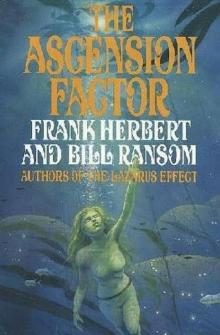 The Ascension Factor
The Ascension Factor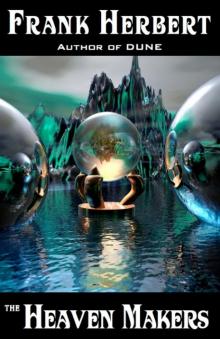 The Heaven Makers
The Heaven Makers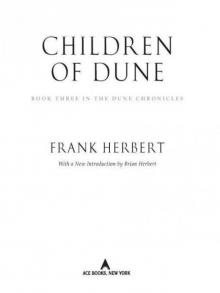 Children of Dune
Children of Dune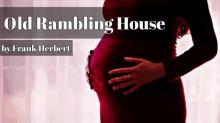 Old Rambling House
Old Rambling House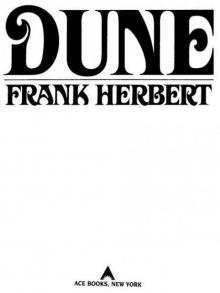 Dune
Dune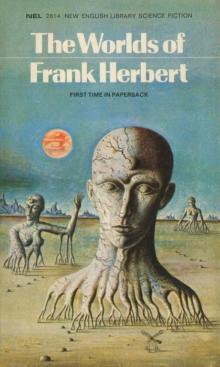 The Worlds of Frank Herbert
The Worlds of Frank Herbert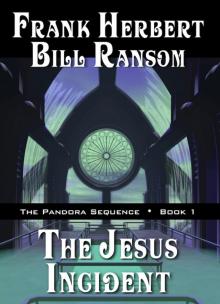 The Jesus Incident
The Jesus Incident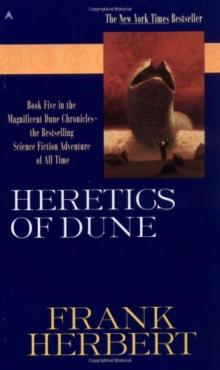 Heretics of Dune
Heretics of Dune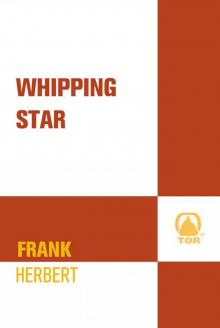 Whipping Star
Whipping Star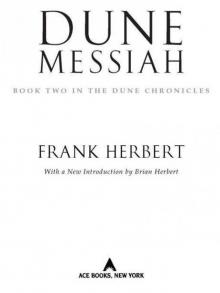 Dune Messiah
Dune Messiah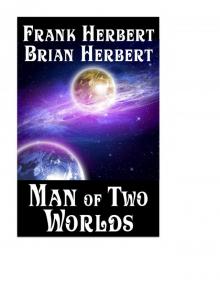 Man of Two Worlds
Man of Two Worlds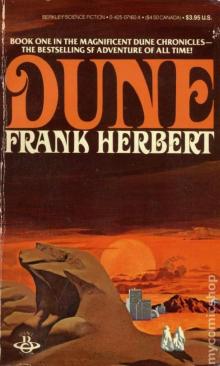 The Book of Frank Herbert
The Book of Frank Herbert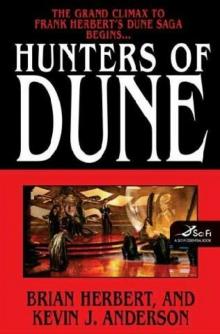 Hunters Of Dune
Hunters Of Dune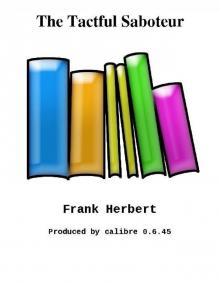 The Tactful Saboteur
The Tactful Saboteur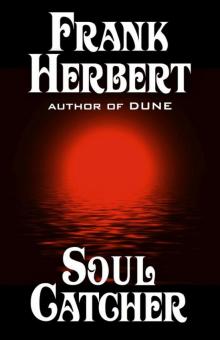 Soul Catcher
Soul Catcher God Emperor of Dune
God Emperor of Dune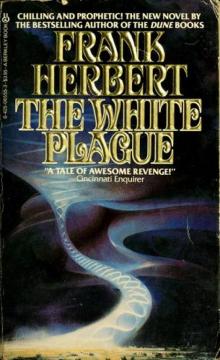 The White Plague
The White Plague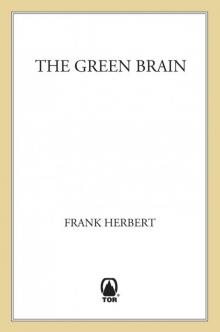 The Green Brain
The Green Brain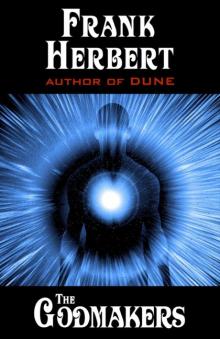 The Godmakers
The Godmakers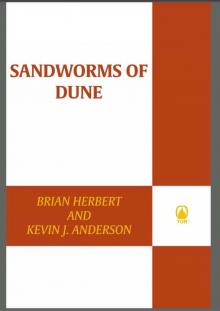 Sandworms of Dune
Sandworms of Dune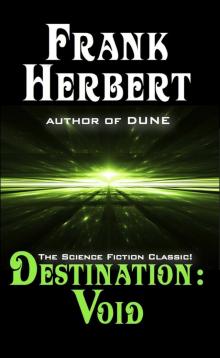 Destination Void
Destination Void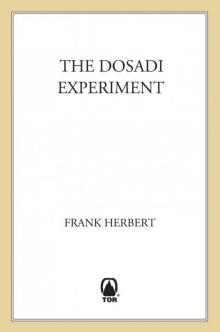 The Dosadi Experiment
The Dosadi Experiment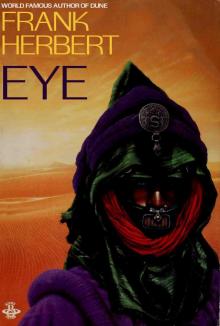 Eye
Eye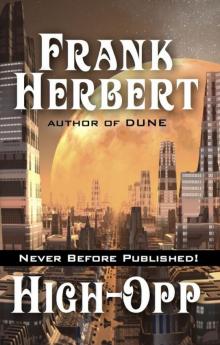 High-Opp
High-Opp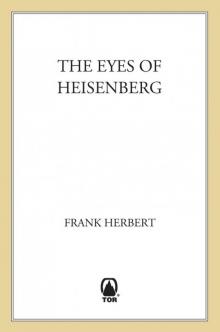 The Eyes of Heisenberg
The Eyes of Heisenberg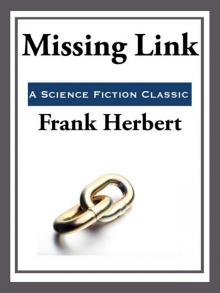 Missing Link
Missing Link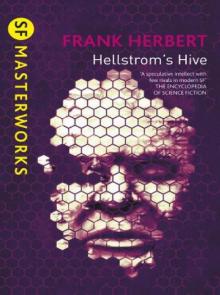 Hellstrom's Hive
Hellstrom's Hive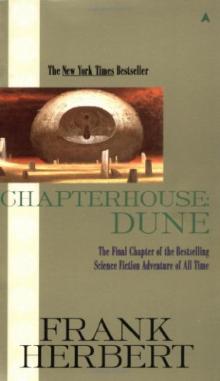 Chapterhouse: Dune
Chapterhouse: Dune The Santaroga Barrier
The Santaroga Barrier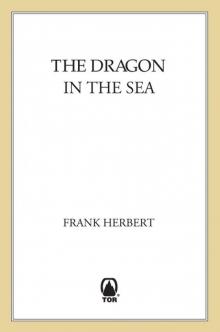 The Dragon in the Sea
The Dragon in the Sea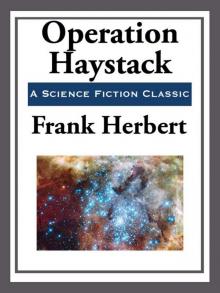 Operation Haystack
Operation Haystack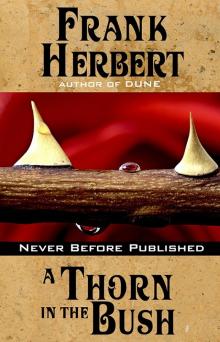 A Thorn in the Bush
A Thorn in the Bush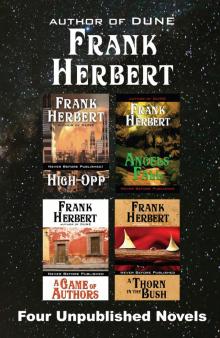 Four Unpublished Novels
Four Unpublished Novels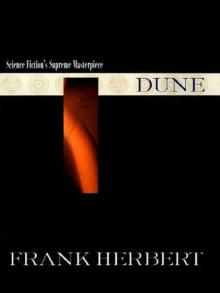 Dune dc-1
Dune dc-1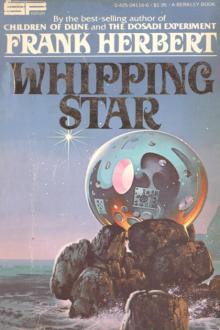 Jorj X. McKie 1 - Whipping Star
Jorj X. McKie 1 - Whipping Star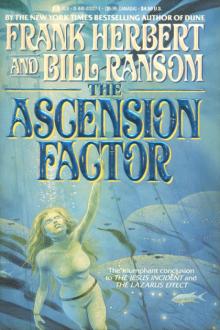 DV 4 - The Ascension Factor
DV 4 - The Ascension Factor Frank Herbert - Dune Book 4 - God Emperor Of Dune
Frank Herbert - Dune Book 4 - God Emperor Of Dune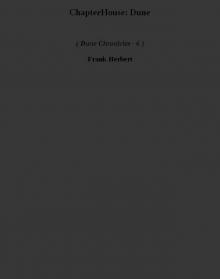 ChapterHouse: Dune dc-6
ChapterHouse: Dune dc-6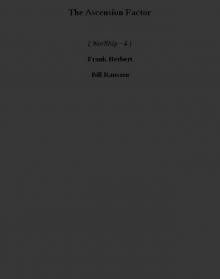 The Ascension Factor w-4
The Ascension Factor w-4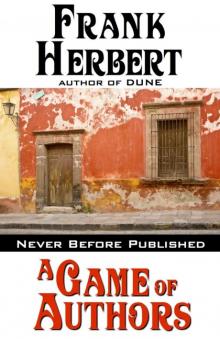 A Game of Authors
A Game of Authors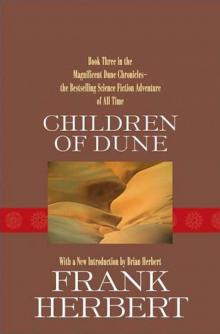 Children of Dune dc-3
Children of Dune dc-3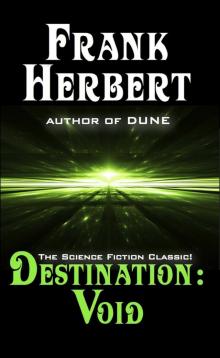 Destination: Void: Prequel to the Pandora Sequence
Destination: Void: Prequel to the Pandora Sequence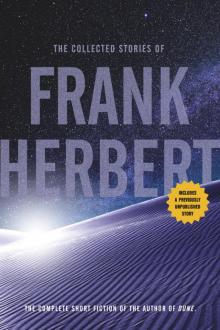 The Collected Stories of Frank Herbert
The Collected Stories of Frank Herbert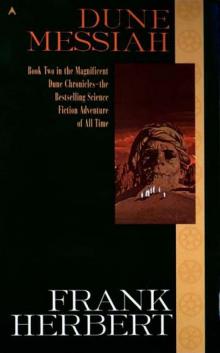 Dune Messiah dc-2
Dune Messiah dc-2 Frank Herbert - Dune Book 5 - Heretics of Dune
Frank Herbert - Dune Book 5 - Heretics of Dune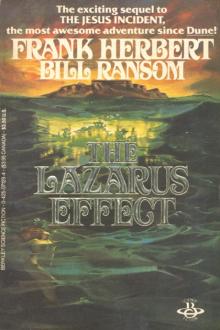 DV 3 - The Lazarus Effect
DV 3 - The Lazarus Effect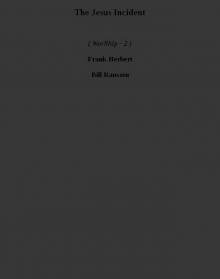 The Jesus Incident w-2
The Jesus Incident w-2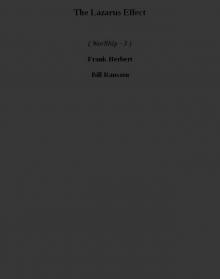 The Lazarus Effect w-3
The Lazarus Effect w-3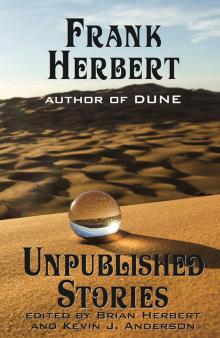 Frank Herbert
Frank Herbert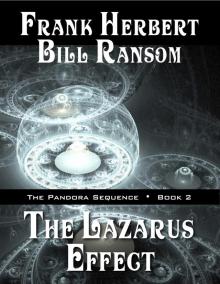 The Ascension Factor: Pandora Sequence
The Ascension Factor: Pandora Sequence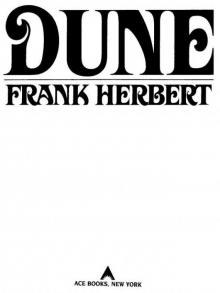 Dune (40th Anniversary Edition)
Dune (40th Anniversary Edition)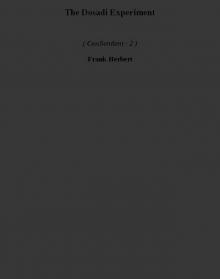 The Dosadi Experiment c-2
The Dosadi Experiment c-2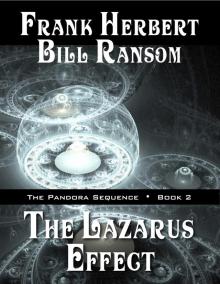 The Lazarus Effect
The Lazarus Effect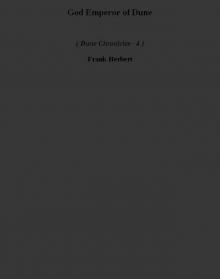 God Emperor of Dune dc-4
God Emperor of Dune dc-4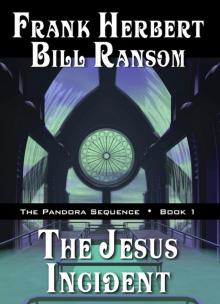 The Pandora Sequence: The Jesus Incident, the Lazarus Effect, the Ascension Factor
The Pandora Sequence: The Jesus Incident, the Lazarus Effect, the Ascension Factor The Green Brain (v4.0)
The Green Brain (v4.0) The Heaven Makers (v4.0)
The Heaven Makers (v4.0)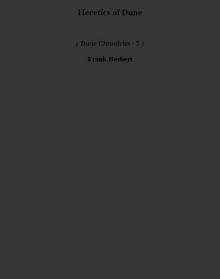 Heretics of Dune dc-5
Heretics of Dune dc-5